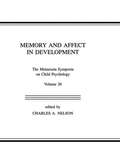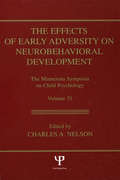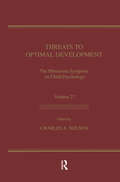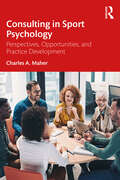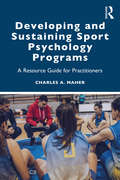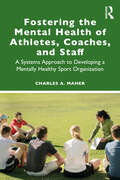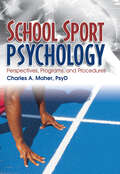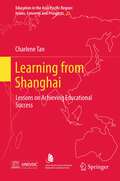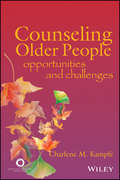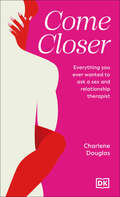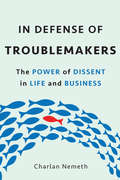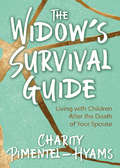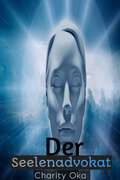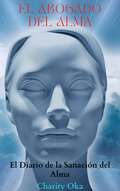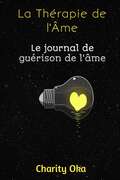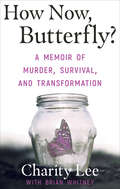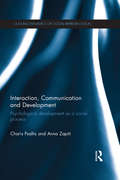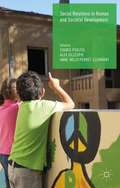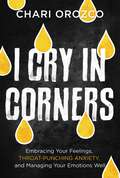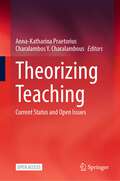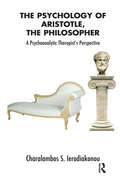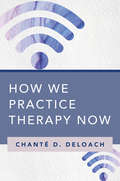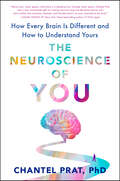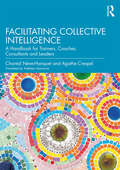- Table View
- List View
Memory and Affect in Development: The Minnesota Symposia on Child Psychology, Volume 26 (Minnesota Symposia on Child Psychology Series #Vol. 26)
by Charles A. NelsonAs in recent years, a thematic concept was selected over a general one for the 26th annual Minnesota Symposium on Child Psychology. In this case the relation between memory and affect was targeted for two reasons. The first concerned the a priori theoretical relation between these content areas. The second concerned the observation that memory and affect have historically been studied as separate content areas--an unfortunate decision considering the potential of each area to inform the other. To redress this, investigators working on the relation between memory and affect were identified. Their presentations are also anchored by one or two presentations on either memory or affect. Those familiar with the broader domain of developmental psychology will readily identify this volume in the series as filling the void left by the lack of integration across domains of study.
The Effects of Early Adversity on Neurobehavioral Development (Minnesota Symposia on Child Psychology Series #Vol. 31)
by Charles A. NelsonThere has been a burgeoning of interest in the relation between biological development--particularly brain development--and behavioral development. This shift in focus does a better job of reflecting the whole child and all of development. Not surprisingly, many of the individuals who are concerned with the theoretical side of brain-behavior relations are also concerned with the more practical side. The chapters that comprise this 31st volume of the Minnesota Symposium series collectively capture the subtle dance between the biological and behavioral aspects of early adversity as it influences neurobehavioral development. Individuals interested in this volume represent the disciplines of developmental psychology and psychopathology, child psychiatry, toxicology, developmental and behavioral pediatrics, behavioral neurology, and special education.
Threats To Optimal Development: Integrating Biological, Psychological, and Social Risk Factors: the Minnesota Symposia on Child Psychology, Volume 27 (Minnesota Symposia on Child Psychology Series #Vol. 27)
by Charles A. NelsonPsychology's recent immersion in risk research has introduced a new variant in which the focus is not solely on disease, but also on the effects and consequences produced by the multiple aspects of risk on individual adaptation. Variations in such patterns of adaptation signal the entrance of protective factors as an added element to the clinical and research focus in the prediction of positive versus negative outcomes under the duress of stressful experiences. Given psychology's investment in the entire range of human adaptation--embracing severe disorder at one extreme and strong positive adaptations at the other--it is not surprising to find this new element of compensatory protective factors as a reshaping factor in the field of risk research. It is one that recognizes and studies the relevance of risk influences on disorder, but also focuses on recovery from disorder or the absence of disorder despite the presence of risk. This latter element implicates the notion of "resilience." It is this opening of the field of risk research that seems to bear the heavy and welcome imprint of psychology. Fundamental to the study of protective factors in development, however, is a broad knowledge base focused on risk factors that often contain the healthy development of infants and children. This volume reflects a continuation of the concerns of the Institute of Child Development with the nature and content of development in multiple contexts. It comes at a most welcome point since the Institute--in collaboration with the University of Minnesota's Department of Psychology--now participates in a jointly shared graduate training program in clinical psychology which stimulates and supports the growth of a newly emergent developmental psychopathology. For this field to advance will require a broad perspective and acceptance of the significance of the diversity of risk factors that extends throughout the life span and results in developmental trajectories that implicate various biological, psychological, and sociocultural risk elements.
Consulting In Sport Psychology: Perspectives, Opportunities, and Practice Development
by Charles A. MaherThis important book provides practical and immediately applicable information about consulting in sport psychology in an accessible, step-by-step manner, focusing on lessons based on individual, team, and organizational levels.Evidence-based information and real-world sport psychology consulting experiences are detailed to enable practitioners to place sport psychology consulting in practical perspectives, identify meaningful and needed opportunities to engage in, and incorporate sport psychology consulting into their professional practices. Each chapter includes viewpoints, methods, procedures, and illustrations, and end-of-chapter exercises which challenge the practitioner to grow as a sport psychology consultant.Intended for practitioners and graduate students of sport psychology, as well as other professionals who consult about the mental aspect of sport and organizational performance, the book provides an authentic guide to consulting and practice development.
Developing and Sustaining Sport Psychology Programs: A Resource Guide for Practitioners
by Charles A. MaherDeveloping and Sustaining Sport Psychology Programs: A Resource Guide for Practitioners outlines a systemic approach to creating comprehensive, sustainable sport psychology programs in professional sports organizations, colleges, universities, and at secondary school levels. Based on the author’s more than 30 years of professional experience, this volume presents a framework that delineates methods for designing, implementing, and evaluating sport psychology programs, discussing topics such as needs assessment and client identification. Featuring real-world experiences and clear, non-technical writing, this step-by-step guide can be applied to a range of sport psychology programs including mental skills, life skills, coach education, leadership training, and team development programs. Developing and Sustaining Sport Psychology Programs details a program development process that has been applied successfully at the professional, collegiate, and secondary school levels over a more than 30-year period. It has contributed to the development of sport psychology programs that have sustained themselves over the course of time and is an essential text for sport psychologists and mental skills coaches at all levels as well as graduate students and other professionals in the field.
Fostering the Mental Health of Athletes, Coaches, and Staff: A Systems Approach to Developing a Mentally Healthy Sport Organization
by Charles A. MaherThis book describes a systems approach for fostering the mental health of athletes, coaches, and staff in sport organizations at professional, collegiate, and secondary school levels. Through this approach, readers can collaborate effectively with a range of professionals in sport organizations, helping to create a mentally healthy entity. Fostering the Mental Health of Athletes, Coaches, and Staff includes a set of sequential, interrelated chapters that detail precise steps along with practitioner exercises. Following an introductory chapter about the evolution of mental health in sport organizations, the systems approach is overviewed in terms of its constituent dimensions. Chapter-by-chapter guidance then is provided about the following activities: Creating a vision and direction for mental health in a sport organization. Assessing the readiness of a sport organization for mental health initiatives. Identifying and involving people as key contributors to mental health. Assessing the mental and emotional development of athletes, coaches, and staff. Designing and implementing mental health programs and services. Educating and training coaches, staff, and administrators about mental health. Establishing a team environment conducive to mental health. Formulating and enacting mental health policies, plans, and procedures. Coordinating mental skills, life skills, and mental health. Evaluating mental health programs and services. Making decisions about improving mental health initiatives. Through its unique and important nature and scope, as well as being the first of its kind to discuss athlete mental health through this specific lens, this book is essential for licensed sport, clinical, and counseling psychologists, as well as other professionals who communicate and collaborate regarding mental health, including mental performance consultants, athletic trainers, and administrators.
School Sport Psychology: Perspectives, Programs, and Procedures (Published Simultaneously As The Journal Of Applied School Psychology, Vol. 21, No. 2 Ser.)
by Charles A MaherFind out how-and why-sports can help you better understand your studentsBecause participation in sports is an integral part of the educational experience for students in both public and private schools, it&’s essential that school psychologists and counselors have a solid foundation to help ensure the well-being of student-athletes. School Sport Psychology is a comprehensive overview of this fast-growing field with guidelines for school psychologists who want to gain a better understanding of sport psychology to extend their skills and enhance their effectiveness. The book presents perspectives, programs, and procedures for working with administrators and coaches to help students develop physically, mentally, and emotionally.School Sport Psychology examines the practical interfaces between school and sport psychology, with an emphasis on parent and family involvement. Contributors representing sport psychology, school psychology, and clinical and community disciplines examine the theory, research, and practice of sport psychology and how its evolution parallels the development of school psychology. The book addresses the benefits and risks of using sport to promote the development of self-esteem, identity, and feelings of competence in students. School Sport Psychology examines: evidence-based sport psychology programs, including GOALS, ATLAS, and ATHENA a case study of the design and implementation of a sport psychology program in an urban high school the use and abuse of alcohol and other drugs among high school student-athletes the use and abuse of steroids eating disorders among high school student-athletes a systems-oriented method of school/sport psychology assessment and intervention program planning and evaluation framework the knowledge and skills needed to work in sport psychology and much moreSchool Sport Psychology is an essential professional resource for psychologists, counselors, and health service providers.
Learning from Shanghai: Lessons on Achieving Educational Success (Education in the Asia-Pacific Region: Issues, Concerns and Prospects #21)
by Charlene TanThe Shanghai school system has attracted worldwide attention since its impressive performance in the International Programme for Student Assessment (PISA) in 2009. The system ranks as a 'stunning success' according to standards of the Organisation for Economic Co-operation and Development (OECD). Shanghai also stands out for having the world's highest percentage of 'resilient students' - students from socio-economically disadvantaged backgrounds who emerge as top performers. Learning From Shanghai: Lessons on Educational Success offers a close-up view of the people and the policies that have achieved such world-class performance. Based on research and personal observation gathered during the author's recent field work with school principals, teachers and students, this book explores the factors that explain Shanghai's exceptional success in education. The approach combines high standards of scholarly research and analysis with the author's unique personal insights, as evidenced by chapters entitled Education is Filling a Bucket and Lighting a Fire and Tiger Mothers, Dragon Children. Drawing on her experience as an education professional and a teacher of teachers, Charlene Tan thoroughly examines and analyzes the people, the policies and the practices that distinguish Shanghai educators. The contents include comprehensive details on the Shanghai approach to quality education, from discussion of the balance between centralization and decentralization, to school autonomy and accountability, to testing policy and professional development for teachers. The book includes detailed tables on curriculum and school performance targets, sample appraisal forms for teachers and students, and dozens of photographs. The author is an Associate Professor at the National Institute of Education, Nanyang Technological University, Singapore.
Counseling Older People: Opportunities and Challenges
by Charlene M. KampfeThis book provides insight into the primary issues faced by older adults; the services and benefits available to them; and the knowledge base, techniques, and skills necessary to work effectively in a therapeutic relationship. Dr. Kampfe offers empirically and anecdotally based strategies and interventions for dealing with clients’ personal concerns and describes ways counselors can advocate for older people on a systemic level. Individual and group exercises are incorporated throughout the book to enhance its practicality. Topics covered include an overview of population demographics and characteristics; counseling considerations and empowering older clients; successful aging; mental health and wellness; common medical conditions; multiple losses and transitions; financial concerns; elder abuse; veterans’ issues; sensory loss; changing family dynamics; managing Social Security and Medicare; working after retirement age; retirement transitions, losses, and gains; residential options; and death and dying. *Requests for digital versions from the ACA can be found on wiley.com. *To request print copies, please visit the ACA website here. *Reproduction requests for material from books published by ACA should be directed to permissions@counseling.org.
Come Closer: Everything You Ever Wanted to Ask a Sex and Relationship Therapist
by Charlene DouglasFeeling a disconnect in your sex life?Sex and relationship therapist Charlene Douglas invites you to connect more, communicate better, and love more deeply.Perhaps you’ve considered seeing a therapist before but you worry it might be awkward or it’s too expensive... Come Closer provides the safe space you need to reflect on the past experiences that may have shaped your sexual world, explore what turns you on and what turns you off, and open up to issues in communication and sexual health.Charlene draws on real-life case studies from her experience helping individuals and couples to navigate different relationship problems and combines this with interactive intimacy tasks at the end of each chapter to give you something practical to work on.So whether you’re hoping to reignite an old spark or build a new sense of confidence in the bedroom, take the first step towards a happy and healthy sex life with Come Closer.
Adjustment to Severe Physical Disability: A Metamorphosis
by Charlene Deloach Bobby G. Greer<p><i>Adjustment to Severe Physical Disability: A Metamorphosis</i>, then, is designed for professionals-in-training, practicing professionals, and parents or families of disabled persons. <p>The book deals with (1) the societal misconceptions that impede the physical, psychological, and social adjustment of disabled persons; (2) the effects these misconceptions have on the attitudes and effectiveness of those who work with disabled persons; and (3) existing services, laws, environmental changes, and technological advances that affect both the efforts of professionals and the lives of disabled persons. In keeping with the goals of this book, the content ranges from hard science to advocacy, from objective data to personal experiences. Case illustrations are designed to stimulate discussion and self-exploration, as well as to illuminate the factual basis for author opinions with no printed sources. Ideally, these illustrations will serve a heuristic function, leading students to conduct needed research into the psychosocial aspects of disability. </p>
In Defense of Troublemakers: The Power of Dissent in Life and Business
by Charlan NemethAn eminent psychologist explains why dissent should be cherished, not fearedWe've decided by consensus that consensus is good. In In Defense of Troublemakers, psychologist Charlan Nemeth argues that this principle is completely wrong: left unchallenged, the majority opinion is often biased, unoriginal, or false. It leads planes and markets to crash, causes juries to convict innocent people, and can quite literally make people think blue is green. In the name of comity, we embrace stupidity. We can make better decisions by embracing dissent. Dissent forces us to question the status quo, consider more information, and engage in creative decision-making.From Twelve Angry Men to Edward Snowden, lone objectors who make people question their assumptions bring groups far closer to truth--regardless of whether they are right or wrong. Essential reading for anyone who works in groups, In Defense of Troublemakers will radically change the way you think, listen, and make decisions.
The Widow's Survival Guide: Living with Children After the Death of Your Spouse
by Charity Pimentel-Hyams“Charity offers hope and practical steps through the darkness and difficulty of grief into the light and new possibilities of life.” —The Reverend Tracy Fye WeatherhoggWithin The Widow’s Survival Guide, Charity Pimentel-Hyams, a widow at thirty-seven with children aged five, three, and one at the time of her husband’s tragic and unexpected death, takes women through the challenges and triumphs of young widowhood. Throughout The Widow’s Survival Guide, women learn:What to do directly after the death of their spouseHow to support themselves and handle grieving children, even when they’re falling apartWhat grief can look like and the symptoms it createsHow to create an action plan for day-to-day lifeStrategies to check in with their heart and stay connected to their lost loved one“A brave and deeply human account of embracing unbearable loss . . . powerful medicine for anyone suffering loss.” —Robin Winn, LMFT“A heartbreaking journey of myriad emotions, love, and loss. I found myself holding my breath through some of the painfully practical details and advice to widows. The love expressed in this book in tangible, honest and devastating.” —Ana-Maria Figueredo, author of The Secret Art of Selling Insurance“Just the right mix of practicality and existentialism . . . anticipates and normalizes the complex emotions associated with early widowhood.” —Megan Greenleaf, MD
Der Seelenadvokat
by Charity OkaWir leben im Allgemeinen in einer Welt, die auf Grenzen ausgerichtet ist, und wir sind dazu erzogen worden, diese Grenzen hoch zu achten und sie sorgfältig zu schätzen und zu berücksichtigen, weil wir glauben, dass sie ideal sind und bessere Beziehungen und tiefere Verbindungen zwischen uns schaffen. Diese Grenzziehung erstreckt sich auch auf Kulturen, Religionen und Familien. Unsere Kulturen und Familien setzen diese Grenzen ausdrücklich fest und hindern die Menschen daran, zu handeln und eigene Grenzen, Überzeugungen ,,,,, und Meinungen zu haben. Und wenn die Gesellschaft und die Eltern ihre Grenzen setzen, erwarten sie von uns, dass wir sie nicht überschreiten, aber unsere individuellen Grenzen werden oft gegen uns zurückgedrängt, damit die Kontrolle der Welt bestehen bleibt. Wenn wir jeden Tag von etwas umgeben sind, gewöhnen wir uns so sehr daran, dass wir es gar nicht mehr hinterfragen. Nur um dann festzustellen, dass die Grenzen nicht das sind, was sie uns vorgaukeln; vielmehr sind sie ein Bündel ungesunder Kontrolle, um uns am Zugang zur Wahrheit zu hindern. Das Festhalten an dieser kalkulierten Täuschung hat uns lange Zeit aus dem Bewusstsein herausgehalten, aber jetzt, wo wir beginnen, intuitive Eingebungen zu haben und die Systeme der Welt zu bewerten, findet eine Bewusstseinsveränderung statt. Die Angst, die uns eingeflößt wird, um in einem illusorischen Gefängnis zu bleiben, beginnt allmählich ihre Macht über uns zu verlieren. Diese Erkenntnis und das jüngste Erwachen, die Bemühungen der Gesellschaft, uns mit Angst und Schuldgefühlen zu managen, das hochqualifizierte Gaslighting und die massenhafte Manipulation der Menschheit unter dem Deckmantel der Grenzen, haben uns eine außerordentliche Freiheit gegeben, das zu tun, was sich richtig anfühlt. Es ist an der Zeit, die Dinge zu verlernen, die für uns nicht mehr nützlich sind, und unsere Wahrheit anzunehmen.
El Abogado del Alma: El Diario de la Sanación del Alma
by Charity OkaEste es un libro de terapia del alma que necesitará para ayudarlo a encontrar el equilibrio en la vida. Mi deseo de ayudar a las personas a encontrar el equilibrio en la vida me hace querer escribir si solo pueden leerlo. Hay un profundo conocimiento, información e ideas para ayudarnos a sanar las heridas infligidas por esta sociedad rota. Estamos decididos a permitir que las personas entiendan las formas en que pueden desarrollar su propósito, cumplir sus destinos y alcanzar su máximo potencial al desacreditar la creencia de que la felicidad viene con la riqueza, ya que ofrecemos secretos verdaderos e ideales para encontrar la felicidad y evolucionar. Este libro hablará directamente a tu alma y nunca volverás a ser el mismo. No hay muchos libros en línea que te brinden el alimento adecuado para el alma. Este libro lo hace muy bien. Quiere leer este libro hoy.
La Thérapie de l'Âme: Le journal de guérison de l'âme
by Charity OkaCe livre vous aidera à trouver l'équilibre dans votre vie. Ce livre propose une thérapie de l'âme, dont vous aurez besoin pour vous aider à trouver l'équilibre dans votre vie. C'est mon souhait d'aider les gens à trouver l'équilibre qui me pousse à écrire. Il existe des connaissances, des informations et des idées profondes pour nous aider à guérir les blessures infligées par la société. Je suis déterminée à faire comprendre aux gens comment ils peuvent atteindre leur but, réaliser leur destin et développer leur plein potentiel, en démystifiant la croyance selon laquelle le bonheur vient avec la richesse, en proposant des solutions utiles pour trouver le bonheur et faire évoluer le moi. Ce livre parlera directement à votre âme, et vous ne serez plus jamais le même après l'avoir lu. Il n'existe pas beaucoup de livres qui nourrissent l'âme. C'est le cas de ce livre, que vous adorerez lire !
How Now, Butterfly?: A Memoir of Murder, Survival, and Transformation
by Brian Whitney Charity LeeA mother recounts her unthinkable experience after her thirteen-year-old son murders his little sister—and her struggle to emerge from devastation. Losing a young daughter to murder is the worst nightmare that a mother could possibly imagine—but what if the killer was her son? Charity Lee was thrust into this unimaginable situation when her thirteen-year-old son, Paris, murdered her beloved four-year-old daughter, Ella. Charity goes through intense grief at the loss of her daughter, while at the same time trying to understand why her son would have done something as horrific as this, and how she could have missed the signs that Paris was a true psychopath. While barely holding herself together throughout her intense grief, Charity is still a mother and feels a need to advocate for her son to receive appropriate treatment while incarcerated, while at the same time trying to ensure he stays in prison so he can never hurt someone again. Charity still loves her son and craves a connection with him despite all he has done. Because of her experiences, she rebuilds her life and starts a non-profit to help other families of victims, as well as offenders. This book is a meditation on grief, loss, and forgiveness unlike any other. It&’s also an inspirational story of a true survivor. How Now, Butterfly? is a haunting memoir that no reader will soon forget.
Interaction, Communication and Development: Psychological development as a social process (Cultural Dynamics of Social Representation)
by Charis Psaltis Anna ZapitiFor decades there has been considerable interest in the ways that interactions between children can provide a beneficial context for the study of cognitive and social development. In this book Psaltis and Zapiti use both theoretical and empirical research to build on the perspectives of Piaget, Vygotsky, Moscovici, and others including the legacy of Gerard Duveen, to offer a state of the art account of research on the themes of social interaction and cognitive development. Interaction Communication and Development discusses the significance of social identities for social interaction and cognitive development. The empirical set of studies presented and discussed focus on patterns of communication between children as they work together to solve problems. Communications are examined in detail with a focus on: Socio-cognitive conflict, conversational moves and conversation types The way the different forms of the interactions relate to different sources of asymmetry in the classroom The way social representations and social identities of gender are negotiated in the interaction This book provides an important account of how children develop through different kinds of social interactions. It will have considerable appeal for researchers in the fields of developmental psychology, socio-cultural psychology, social representations theory and education who wish to gain a deeper understanding of development and its relation to socio-cultural processes.
Social Relations in Human and Societal Development
by Charis Psaltis Alex Gillespie Anne-Nelly Perret-ClermontSocial interaction is part of human life and is the engine which drives an individual's psychological development, creating changes on all levels of society. Through a collection of essays by internationally renowned academics from a range of disciplines, including social psychology, international relations and child development, Social Relations in Human and Societal Development examines the effect of this integral force on human life. Each chapter explores the role of social relations in a particular domain to provide a broad understanding of the role of social relations in human and societal development.
I Cry in Corners: Embracing Your Feelings, Throat-Punching Anxiety, and Managing Your Emotions Well
by Chari OrozcoIt's easy to get lost in all the feels. Our emotions drive so much of what we do, say, and think, even if we don&’t realize it. Our response to our feelings—denying they exist, letting them lead our actions unchecked, distracting ourselves to avoid feeling them—can greatly impact our lives and those around us. Emotions are essential for everyday life, but how we navigate them in the storms of life will make or break us. In I Cry in Corners, pastor Chari Orozco takes the readers through the life of Jesus, examining the powerful emotional tests he faced and how he responded, from his terror in the Garden of Gethsemane to his righteous anger in the temple to his disappointment when those he loved best betrayed him. In each chapter, Chari gives readers both practical and spiritual wisdom to help them respond to emotions like Jesus did. How do we steward our emotions when those closest people fail us? We turn around and wash the feet of the ones we love. How do we face temptation? We refuse to get hangry, resist the devil, and remember that our value lies not in what we have but how we love. How do we steward our emotions with maturity when the hurt we&’ve suffered comes from those who claim to know and love Jesus? We do what Jesus did: choose our words wisely, keep our eyes on the joy set before us, and, if necessary, flip over some tables. Our feelings are a gift from God, and through the life and struggles of Jesus, we find a blueprint for honoring your feelings without getting lost in them. Written with a wry, straight-talking, irreverent but always faithful tone, Chari effortlessly weaves together stories of the New Testament with her own insightful, humorous, and refreshingly candid anecdotes. The resulting book is an affirmation of feeling all the feels while encouraging readers to use their emotions as a catalyst for deep spiritual growth.
Theorizing Teaching: Current Status and Open Issues
by Anna-Katharina Praetorius Charalambos Y. CharalambousThis open access book seeks to create a forum for discussing key questions regarding theories on teaching: Which theories of teaching do we have? What are their attributes? What do they contain? How are they generated? How context-sensitive and content-specific do they need to be? Is it possible or even desirable to develop a comprehensive theory of teaching? The book identifies areas of convergence and divergence among the answers to these questions by prominent international scholars in research on teaching. Initiating exchanges among the authors, it then evaluates whether consensus can be reached on the areas of divergence. The book concludes by discussing lessons learned from this endeavor and outlines steps that need to be taken for advancing future work on theorizing teaching. As such, the book is aimed at readers interested in an overview of the theorizing of teaching and key open questions that, if addressed, help to move the field forward.
The Psychology of Aristotle, The Philosopher: A Psychoanalytic Therapist's Perspective
by Charalambos IerodiakonouIn this book, the author collects and discusses views and ideas of the ancient philosopher Aristotle which have psychological interest and compares them with today's theories. First, the soul-body problem is presented showing that Aristotle accepts a psychosomatic unity theorizing the human being in a holistic approach. Then the mental functions are described according to the aristotelian definitions, together with their interactions.
How We Practice Therapy Now
by Chanté D. DeLoachEssential approaches to clinical practice for today’s out-of-office world. Future psychotherapy is not confined to the office: it can be online, virtual, wellness-oriented, flexible, racially conscious, and in service of public wellness. COVID-19 has forever changed the landscape of psychotherapy in these ways, and in ways we have yet to discover. Practicing psychologist Chanté D. DeLoach invites readers to reflect on the state of psychotherapy and emerging potentialities forged through crisis. She presents key concepts of telemental health, concierge therapy, and other out-of-office approaches to psychological well-being. DeLoach provides step-by-step guidance on getting started in telemental health, and points to clinical, ethical, and legal considerations for clinicians working in a digital space and other nontraditional formations. Topics covered include: how to screen clients for the appropriateness of teletherapy; the required equipment and infrastructure, demystifying the different online platforms; ways to set up a warm and inviting online office, and legal and ethical issues of remote therapy. It also considers business and practice management issues such as what to include in an informed consent for teletherapy. Important discussions of race, intersectionality, and justice in teletherapy round out the book. Readers will be invited to critically reflect on their own identities and comfort in integrating the challenging issues of race, power, and privilege in clinical work. Through interwoven examples and reflective exercises, Dr. DeLoach provides tools to support practitioners as they reimagine their clinical identities to meet the needs of today’s clients. This book offers keen insights and learning for all clinicians, from trainees to seasoned practitioners, who are embarking on this new terrain.
The Neuroscience of You: How Every Brain Is Different and How to Understand Yours
by Chantel PratFrom University of Washington professor Chantel Prat comes The Neuroscience of You, a rollicking adventure into the human brain that reveals the surprising truth about neuroscience, shifting our focus from what&’s average to an understanding of how every brain is different, exactly why our quirks are important, and what this means for each of us. With style and wit, Chantel Prat takes us on a tour of the meaningful ways that our brains are dissimilar from one another. Using real-world examples, along with take-them-yourself tests and quizzes, she shows you how to identify the strengths and weakness of your own brain, while learning what might be going on in the brains of those who are unlike you. With sections like &“Focus,&” &“Navigate,&” and &“Connect,&” The Neuroscience of You helps us see how brains that are engineered differently ultimately take diverse paths when it comes time to prioritize information, use what they&’ve learned from experience, relate to other people, and so much more. While other scientists focus on how &“the&” brain works &“on average,&” Prat argues that our obsession with commonalities has slowed our progress toward understanding the very things that make each of us unique and interesting. Her field-leading research, employing cutting-edge technology, reveals the truth: Complicated as it may be, no two brains are alike. And individual differences in brain functioning are as pervasive as they are fundamental to defining what &“normal&” looks like. Adages such as, &“I&’m not wired that way&” intuitively point to the fact that the brains we&’re piloting, educating, and parenting are wonderfully distinct, explaining a whole host of phenomena, from how easily a person might learn a second language in adulthood to whether someone feels curious or threatened when faced with new information. This book invites the reader to understand themselves and others by zooming in so close that we all look gray and squishy.
Facilitating Collective Intelligence: A Handbook for Trainers, Coaches, Consultants and Leaders
by Chantal Nève-Hanquet Agathe CrespelChantal Nève-Hanquet and Agathe Crespel provide an accessible and ground-breaking guide to genuinely effective group work, sharing excellent hands-on assistance for coaches and facilitators. Offering a unique selection of guidelines and illustrations for group work, the authors demonstrate the benefits of using creative action methods in practice, helping leaders discover new ways to achieve dynamic group sessions and endowing their work with new vigour, as well as pleasure. Facilitating Collective Intelligence brings together a wealth of knowledge and techniques from psychodrama, Jungian and systemic analysis to inform group facilitation. Throughout the book's four parts, key inner attitudes, questions and action techniques are explored to help facilitators nourish open and flexible forms of communication within groups, stimulate collective intelligence and foster creative approaches to collective problem-solving. With the help of numerous sensitively related case studies, the book guides the reader through the process of achieving more dynamism in group work, fostering creativity, encouraging agility and developing co-construction within groups. It contains more than thirty practical reference sheets which provide an instant aid for implementing the methods and models in the book. Nève-Hanquet and Crespel’s approach advocates the use of actions methods, specifically the ARC model, to encourage 'out of the box' thinking and develop new paths and strategies in working with teams and organizations. Facilitating Collective Intelligence is an invaluable and essential tool in cultivating effective group dynamics for all coaches, coach supervisors and consultants, both experienced and in training. Due to its clear and practical structure, it will also be useful for counsellors, coaching psychologists and other professionals who work with groups, as well as students and academics of coaching and coaching psychology.
